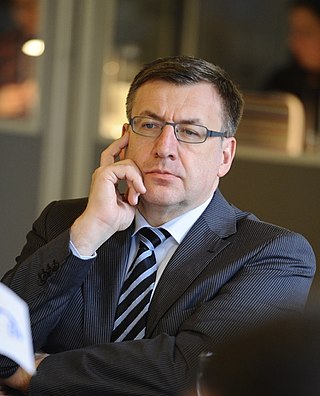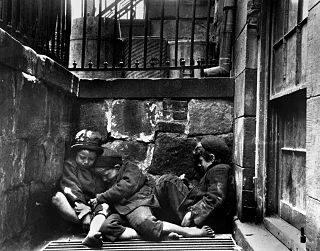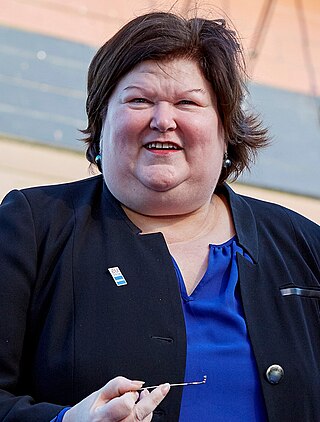
The Flemish Community is one of the three institutional communities of Belgium, established by the Belgian constitution and having legal responsibilities only within the precise geographical boundaries of the Dutch-language area and of the bilingual area of Brussels-Capital. Unlike in the French Community of Belgium, the competences of the Flemish Community have been unified with those of the Flemish Region and are exercised by one directly elected Flemish Parliament based in Brussels.

The Flemish Government is the executive branch of the Flemish Community and the Flemish Region of Belgium. It consists of a government cabinet, headed by the Minister-President and accountable to the Flemish Parliament, and the public administration divided into 13 policy areas, each with an executive department and multiple agencies.
Child protection refers to the safeguarding of children from violence, exploitation, abuse, and neglect. It involves identifying signs of potential harm. This includes responding to allegations or suspicions of abuse, providing support and services to protect children, and holding those who have harmed them accountable.
In many jurisdictions in the Western world, a mandated reporter is a person who is legally required to report observed or suspected abuse. Specific details vary across jurisdictions—the abuse that must be reported may include neglect, or financial, physical, sexual, or other types of abuse. Mandated reporters may include people working in professions perceived to be likely to expose them to vulnerable people, though it may also include unpaid people who have assumed full or intermittent responsibility for the care of a child, dependent adult, or senior citizen.
Child protective services (CPS) is the name of an agency in many states of the United States responsible for providing child protection, which includes responding to reports of child abuse or neglect. Some states use other names, often attempting to reflect more family-centered practices, such as department of children and family services (DCFS). CPS is also sometimes known by the name of department of social services, though these terms more often have a broader meaning.

Johan Maria Gerardus Vandeurzen is a Belgian politician, member of Christen-Democratisch en Vlaams (CD&V), a centrist Flemish Christian Democratic party.

Safeguarding is a term used in the United Kingdom, Ireland and Australia to denote measures to protect the health, well-being and human rights of individuals, which allow people—especially children, young people and vulnerable adults—to live free from abuse, harm and neglect.

Steven Vanackere, is a Belgian politician from Flanders and member of the Christian Democratic and Flemish party (CD&V). He held the portfolios of Deputy Prime Minister of Belgium and Minister of Foreign Affairs and Institutional Reform in the Leterme II government. He is the son of Leo Vanackere, who, following a political career as a Member of the Chamber of Representatives and the Senate of Belgium, became the Provincial Governor of West Flanders in 1979. His grandfather, Remi Wallays, had also been a senator and had been a former Mayor of Wevelgem.

Healthcare in Belgium is composed of three parts. Firstly there is a primarily publicly funded healthcare and social security service run by the federal government, which organises and regulates healthcare; independent private/public practitioners, university/semi-private hospitals and care institutions. There are a few private hospitals. Secondly is the insurance coverage provided for patients. Finally, industry coverage; which covers the production and distribution of healthcare products for research and development. The primary aspect of this research is done in universities and hospitals.
A children's ombudsman, children's commissioner, youth commissioner, child advocate, children's commission, youth ombudsman or equivalent body is a public authority in various countries charged with the protection and promotion of the rights of children and young people, either in society at large, or in specific categories such as children in contact with the care system. The agencies usually have a substantial degree of independence from the executive, the term is often used differently from the original meaning of ombudsman, it is often an umbrella term, often used as a translation convention or national human rights institutions, dealing with individual complaints, intervening with other public authorities, conducting research, and – where their mandate permits them to engage in advocacy – generally promoting children's rights in public policy, law and practice. The first children's commissioner was established in Norway in 1981. The creation of such institutions has been promoted by the United Nations Committee on the Rights of the Child, and, from 1990 onwards, by the Council of Europe.

Foster care is the term used for a system in which a minor who has been made a ward is placed in an institution, group home, relative placement, or private home of a state certified caregiver. The placement of the child is usually arranged through the government or a social-service agency. The institution, group home, or foster parent is paid. The state via the family court and child protection agency stand in loco parentis to the minor, making all legal decisions, while the foster parent is responsible for the day-to-day care of the minor. The foster parent is remunerated by the state for their services.

Maggie Celine Louise De Block is a Belgian politician of the Open VLD who has been chairing her party's group in the Chamber of Representatives since 2020.

The Wisconsin Department of Children and Families (DCF) is an agency of the Wisconsin state government responsible for providing services to assist children and families and to oversee county offices handling those services. This includes child protective services, adoption and foster care services, and juvenile justice services. It also manages the licensing and regulation of facilities involved in the foster care and day care systems, performs background investigations of child care providers, and investigates incidents of potential child abuse or neglect. It administers the Wisconsin Works (W-2) program, the child care subsidy program, child support enforcement and paternity establishment services, and programs related to the federal Temporary Assistance to Needy Families (TANF) income support program.
In many parts of the world, mandated reporters are people who have regular contact with vulnerable people such as children, disabled persons, and senior citizens, and are therefore legally required to ensure a report is made when abuse is observed or suspected. Specific details vary across jurisdictions—the abuse that must be reported may include neglect, or financial, physical, sexual, or other types of abuse. Mandated reporters may include paid or unpaid people who have assumed full or intermittent responsibility for the care of a child, dependent adult, or elder.
The Flemish Care Inspectorate is a part of the Department of Welfare, Public Health and Family of the Flemish Government. The Flemish Government is the executive branch of the Flemish Community of Belgium. In Belgium, the Communities are responsible for the inspection of health and welfare services and establishments. The Care Inspectorate consists of two complementary divisions of the department: one for the inspection of services for disabled people and child care services, and one for the inspection of welfare services, health services and financial matters. Together, they inspect all services and establishments in these domains that are recognised, licensed or subsidised by the department or any agency associated with it. The Care Inspectorate also inspects disabled people who receive a so-called personal assistance budget or financial compensation for assistive tools.
The Department of Welfare, Public Health and Family is a department of the Flemish Government. The Flemish Government is the executive branch of the Flemish Community of Belgium. The department is a part of the so-called Welfare, Public Health and Family policy area, which consists of the department and a few associated agencies. The minister responsible for the department is the minister of Welfare, Public Health and Family of the Flemish Government. The current minister in the Bourgeois Government, which assumed office in 2014, is Jo Vandeurzen of the Christian Democratic and Flemish party. The department itself is led by a secretary-general. The department consists of nine divisions, of which the services of the secretary-general form one. Two of those divisions also form the Care Inspectorate, which inspects all health and welfare services and establishments that are recognised, licensed or subsidised by the department or any agency associated with it.
The Agency for Care and Health is an agency of the Flemish Government. The Flemish Government is the executive branch of the Flemish Community of Belgium. In Belgium, the Communities are responsible for certain aspects of social care, health care and public health policy. The Agency for Care and Health is responsible for the recognition, licensing and subsidising of various providers and services for health care, elderly care, home care, residential care, and other forms of care, for facilitating the cooperation and data sharing between these services, for the organisation of preventive health services such as vaccinations and screening programs, for the control of infectious diseases, for environmental health monitoring, and for the organisation of the Flemish social protection programs. The Agency for Care and Health relies on the Flemish Care Inspectorate for the inspection of any of the services it is responsible for.
The Youth Welfare Agency is an agency of the Flemish Government responsible for child welfare.









